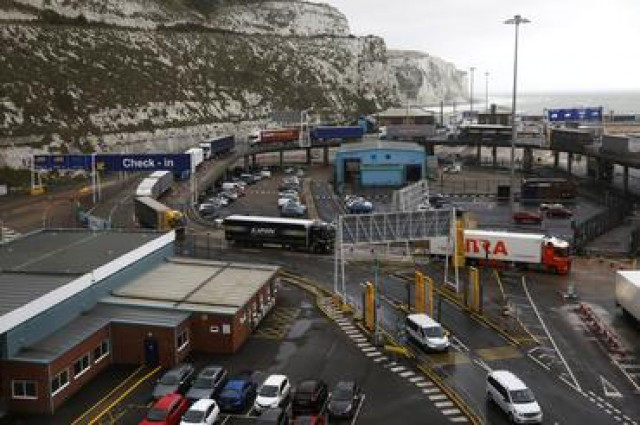 Ukraine reports 5,276 new COVID-19 cases
Ukraine reports 5,276 new COVID-19 cases
 Zelensky: Every third Ukrainian considers road construction one of greatest achievements of 2021
Zelensky: Every third Ukrainian considers road construction one of greatest achievements of 2021
 Ukraine ready to implement Minsk agreements, but Russia's desire needed - Yermak
Ukraine ready to implement Minsk agreements, but Russia's desire needed - Yermak
 Michel: EU unanimously agree to roll over economic sanctions against Russia
Michel: EU unanimously agree to roll over economic sanctions against Russia
 Actions by Ukraine's partners will help prevent worst-case scenario - Zelensky
Actions by Ukraine's partners will help prevent worst-case scenario - Zelensky
 COVID-19 in Ukraine: Health officials confirm 8,899 daily cases as of Dec 17
COVID-19 in Ukraine: Health officials confirm 8,899 daily cases as of Dec 17
 Macron tells Zelensky he declared support for Ukraine in call with Putin
Macron tells Zelensky he declared support for Ukraine in call with Putin
 Zelensky, Scholz discuss gas transit through Ukraine after 2024
Zelensky, Scholz discuss gas transit through Ukraine after 2024
 Ukraine ready for any format of talks with Russia - Zelensky
Ukraine ready for any format of talks with Russia - Zelensky
 Ukraine’s only journalist in Russia facing extremism charges - lawyer
Ukraine’s only journalist in Russia facing extremism charges - lawyer
 PM Shmyhal: First two applications for investment projects worth $96 million filed
PM Shmyhal: First two applications for investment projects worth $96 million filed
 Zelensky, PM of Italy discuss security situation around Ukraine
Zelensky, PM of Italy discuss security situation around Ukraine
 President signs off State Budget 2022
President signs off State Budget 2022
 London considering all options for responding to Russia's aggression against Ukraine
London considering all options for responding to Russia's aggression against Ukraine
 Putin, Biden to hold another round of talks
Putin, Biden to hold another round of talks
 Some 260,000 Ukrainians “victims of human trafficking” over 30 years - prosecutor general
Some 260,000 Ukrainians “victims of human trafficking” over 30 years - prosecutor general
 Ukraine plans to create center to protect energy infrastructure from cyber attacks
Ukraine plans to create center to protect energy infrastructure from cyber attacks
 No clear idea so far when Normandy Four top diplomats set to meet - German Ambassador
No clear idea so far when Normandy Four top diplomats set to meet - German Ambassador
 Ukraine receives EUR 600M in macro-financial assistance from EU
Ukraine receives EUR 600M in macro-financial assistance from EU
 Zelensky holds phone conversation with PM of Israel
Zelensky holds phone conversation with PM of Israel
 Ukraine sets new daily COVID vaccination record
Ukraine sets new daily COVID vaccination record
 MFA: European Union has not yet removed Ukraine from list of safe countries
MFA: European Union has not yet removed Ukraine from list of safe countries
 Kyiv records 1,023 new COVID-19 cases, 29 deaths
Kyiv records 1,023 new COVID-19 cases, 29 deaths
 G7 ambassadors welcome adoption of law on NABU status
G7 ambassadors welcome adoption of law on NABU status
 Ukraine can increase Covid vaccination rates to 1.5M a week – Liashko
Ukraine can increase Covid vaccination rates to 1.5M a week – Liashko
Deal or no deal, British companies will have to confront a wall of bureaucracy that threatens chaos at the border if they want to sell into the world’s biggest trading bloc when life after Brexit begins on January 1.
When Britain casts off from the European Union, firms that drive nearly $1 trillion in annual trade will have to navigate myriad new rules and red tape that will increase costs just as COVID-19 bleeds the economies of the West.
Outside the EU single market where trade flows freely, Britain’s exporters will have to complete a raft of paperwork including customs and safety declarations and navigate multiple IT systems to gain entry to Europe.
But with a matter of weeks to go, companies used to trading as easily to Berlin as to Birmingham are yet to see the new IT systems.
Customs brokers have not been trained, operators do not know what information is required nor how the rules will be enforced.
Many have predicted chaos. Even the government has said 7,000 trucks could be held in 100-km queues in Kent, south-east England, if companies do not prepare.
“It’s going to be carnage,” Tony Shally, managing director of freight specialist Espace Europe, told Reuters. “We’ll be fire-fighting from the 1st of January.”
The current row over whether Britain leaves the EU with or without a deal has helped mask the fact that the deal on offer represents the biggest change to UK trade since the formation of the single market in 1993.
Outside the bloc, companies will have to complete paperwork and submit goods for random checks to cross borders, increasing both the cost and time it takes to do business.
In 2019 Britain, the world’s sixth-largest economy, imported EU goods worth 253 billion pounds ($331 billion) and exported 138 billion pounds-worth to the bloc, when removing goods like oil and gold which distort trade flows.
























































































































